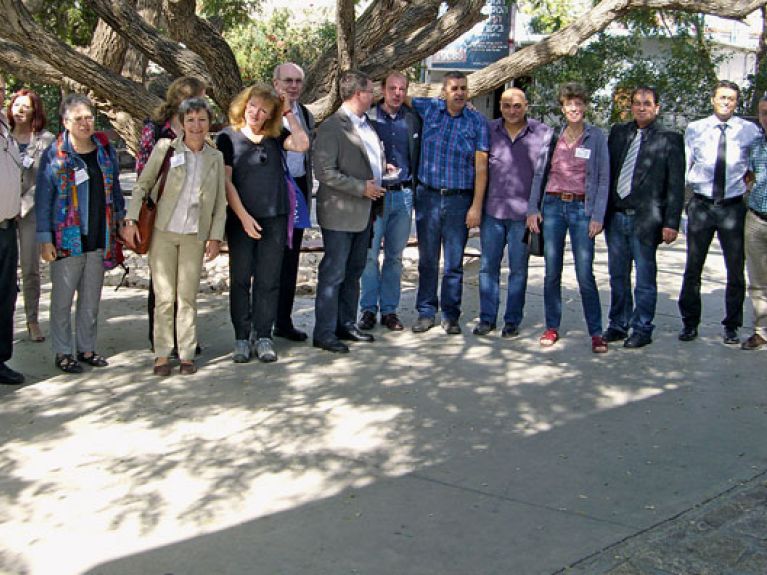Travel broadens the mind
The German-Israeli Programme for Cooperation in Vocational Education and Training enables experts and trainees to gain detailed insights into the partner country.

It’s a feeling almost everyone gets when they travel to Israel: in the end you have learned an awful lot, yet you are incredibly confused. “I started out with 100 questions and came back with 1,000,” says Susanne Krey-de Groote. In April 2016 the Director of Studies at the Lindenstrasse Vocational College in Cologne took part in a study tour that takes education experts and practitioners from Germany to Israel and from Israel to Germany every year.
“Surprise learning” is what Andrea Pingel calls it, and has a lovely example at the ready. Pingel is coordinator of Kooperationsverbund Jugendsozialarbeit, an association for youth and social work backed by large charitable organisations, and she took part in the study tour in 2014 when it focused on inclusion. When someone in Germany refers to inclusion, they usually mean that all children and young people should have the same access to education in the same type of school rather than in the three-tier selective school system plus special needs schools. Pingel, who is from Berlin, went to Israel with this basic assumption, only to discover that Israeli students are separated according to very different criteria – for example, because they are from an Arab, Jewish or ultraorthodox family. Pingel recalls: “If you have a German view of inclusion, this is a fascinating observation.” Similarly, it would be inconceivable in Germany for time spent in the army to be considered a binding, integrative and identity-forming period in life. But that too involves restrictions, because the majority of young Arabs and Jewish-orthodox people do not have to do military service.
Andrea Pingel also discovered something she would love to see in Germany: education researchers at several Israeli universities, such as the Weizmann Institute for the Sciences in Rehovot, focus not only theoretically on improving the opportunities of disadvantaged schoolchildren. The latter are also taught at the same site as student teachers. “When it comes to teacher education, we in Israel are fairly active in combining theory and practice,” Gilmor Keshet explains. She coordinates the training of science teachers at the Hebrew University in Jerusalem and took part in the study tour in June. “During my visit in Germany, I was impressed by the much more common vocational (dual) training.”
Since 1976 the study tours have focused on a different subject every year. Teacher training has already been on the programme, as have quality management in education, green technologies and entrepreneurial independence. The theme is always relevant to the field of vocational education, which in Israel is organised in a fundamentally different way from in Germany. The proportion of a year group entering higher education in Israel is much higher at 60%, and where vocational education exists, it is shorter and mainly carried out in schools.
Only 5% of school-leavers in Israel do in-company vocational training, compared to 48% in Germany. Many Israeli experts wish the figure was higher. Keshet explains: “Vocational education does not have the very best reputation in Israel, so if we find better ways of connecting working in factories and companies with studying, it may increase the numbers of students in VET.” The tour also took the Israeli to appointments with the Stuttgart Region Chamber of Crafts and the Federal Institute for Vocational Education and Training (BIBB) in Bonn. In a meeting with the Central Examinations Office, ZPA North-West, the vocational education experts exchanged views on how Germany tests its trainees’ skills. After all, this year’s subject was skills assessment and examinations in vocational education.
The study tours are part of the German-Israeli Programme for Cooperation in Vocational Education and Training, which is coordinated by the National Agency Education for Europe at the BIBB. The partnership has existed almost since diplomatic relations were established in 1965. It began in 1969 as a collaboration between the Israeli Ministry of Economics and the Federal Ministry of Labour. The Federal Ministry of Education and Research has been the responsible German partner since 1976.
Initially, the study tours only went in one direction: to Germany. Skilled Israeli tradespeople received further training grants and therefore became early Israeli visitors to a country that had only just begun to engage with its past. The study tours were added in 1976, although at that time they were called “specialist information visits”. Several years later came inter-ministerial conferences on vocational training. Since 1999 German and Israeli experts have been developing joint concepts and materials for vocational training.
Since 2012, the German-Israeli programme has had a further flagship: trainee exchanges, which also have a different focal point each year. Atar Mandel, a trainee in architecture and design, took part in 2015. Together with 17 other Israelis who were learning a building trade, she spent three weeks in Germany. Atar hoped to learn about new materials and techniques as well as about another culture. According to the 28-year-old, her expectations were “more than fulfilled”. However, 2015 was also a year when there was no exchange in the literal sense. Because of the tense security situation following numerous knife attacks, the planned visit by young Germans did not take place. “It is not always easy to motivate young German trainees to take part,” says Monique Nijsten from the National Agency at the BIBB, “although they are under the special protection of our partners once there they are.” In 2016 young cooks will take an in-depth look at the respective other country. In any event, interest in Germany’s dual vocational education system is increasing among the Israeli partners, says Nijsten: “The lack of skilled personnel has hit Israel perhaps even harder than Germany, so the question of appropriate training is even more urgent.” ▪
Jeannette Goddar

